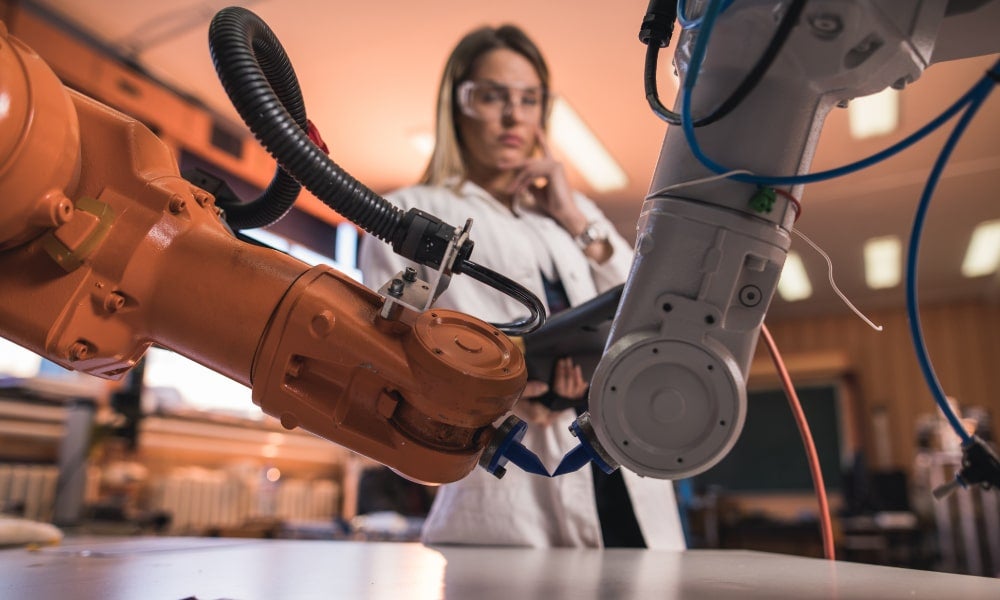This time it will be different: are the robots really coming for your job?
Download The Business Of podcast on your favourite podcast platform.
For certain tasks, AI outclasses experts. But the question is whether AI will be used as a replacement or in addition to work, writes UNSW Business School’s Frederik Anseel
The fact that screenwriters are striking in Hollywood is not big news, but their package of demands is striking. One of their points of contention is that 'only humans and not AI chatbots should write or rewrite literary material'.
Robots taking your job. The idea is as old as robots themselves. In front of me is a nice collage from Der Spiegel. The robot job robbery was predicted on the cover of the German magazine in 1964, in 1978 and again in 2017. Even the economist John Keynes predicted that his grandchildren would only work 15 hours a week because of technological progress.

In the ultimate robot cartoon 'WALL-E' people have short fingers, short legs and no neck. After all, they have nothing to do; even tennis and golf are played by robots. Writing this from under my sofa blanket, I personally would not say no to a world of hedonism and laziness, but feel free to replace my preference for laziness with in-depth philosophical conversations and cultural enrichment for all I care. The point is – it ain't going to happen.
As Carmen Reinhart famously quipped, more money has been lost because of four words than at the point of a gun. Those words are "This time is different.” When it comes to the future of work, will this time be different after all? A few fundamental fallacies lie at the basis of robot doom thinking. The main one is that in the world there is such a thing as a fixed amount of labour. If a robot takes over a job, that job will disappear and there will be less work left for people to perform. Throughout history, quite a few people believe in the idea of a fixed amount of labour. It explains why people are afraid of migration ("they come here to take away our jobs") or why we think it is good that people should retire at 65 ("make way for the next generation").
That does not mean, of course, that no jobs are disappearing. Of course, they do. Compare a typical office environment to that of 60 years ago and you will hardly see typists, clerks or secretaries anymore. I'm not even talking about how unrecognisable a car factory has become. The fallacy is not that jobs are disappearing, but that jobs that we cannot yet imagine are constantly being created. I challenge you to explain to someone from the 80s what a social media influencer does. New needs create new work. Because people want to get ahead, are status-oriented and competitive, new needs are always emerging. It’s called hedonic adaptation.

Beware doomsday predictions
But isn't it different this time? This time, not only routine jobs are under threat. That was the prediction ten years ago: routine jobs would disappear, but jobs based on social skills, creativity and expertise were safe. Let that be precisely the type of tasks in which artificial intelligence (AI) is particularly good. AI is creative, chatters and argues vehemently, it's truly a delight to see. And once connected to the internet, the expertise and resulting creativity is inexhaustible. The Hollywood screenwriters may be right. AI is already taking over tasks at work and it is white collar jobs that are under threat.
Let’s call a spade a spade. For certain tasks, AI outclasses all the experts. That means it's going to be damn hard for a group of people if they don't adapt quickly. But it can also be a source of productivity. The question is whether AI will be used as a replacement or in addition. Let me give a recent example from the medical industry. Mammograms are usually analysed by two doctors. But a new study found using one doctor with AI assistance detected 20 per cent more cancers and reduced the workload by 44 per cent. However, another study found that, while AI was more accurate than two-thirds of radiologists, when radiologists had AI help their diagnoses did not improve. Why? Humans ignored the AI’s advice when it conflicted with their views.
Making predictions about jobs disappearing is like crystal ball gazing. The British journalist Martin Wolf compares it to someone who tries to predict the influence of the printing press on the back of an envelope in 1455.
Subscribe to BusinessThink for the latest research, analysis and insights from UNSW Business School
Beware of doomsday predictions such as the 2013 Oxford study that predicted that 47 percent of all jobs would disappear. Ten years later, global unemployment is extremely low. The countries with the highest levels of automation and robots, such as Japan, Singapore and South Korea, have good employment rates, with no decline in job satisfaction. Bring on the AI robots, I embrace them with a thousand arms. Famous last words, I know.
Frederik Anseel is Professor of Management and Senior Deputy Dean (Academic) at UNSW Business School. His research focuses on the motivational micro-foundations of how people contribute to organisational success. For more information, please contact Prof. Anseel directly. A version of this post was first published in De Tijd.
